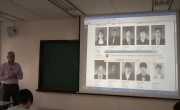This study intended to investigate how corresponding Korean grammar rules used in Korean grammar books written by Russian scholars are accepted in Korean school grammar and how Russian linguists understand aspects of Korean grammar. The goal of this s...
http://chineseinput.net/에서 pinyin(병음)방식으로 중국어를 변환할 수 있습니다.
변환된 중국어를 복사하여 사용하시면 됩니다.
- 中文 을 입력하시려면 zhongwen을 입력하시고 space를누르시면됩니다.
- 北京 을 입력하시려면 beijing을 입력하시고 space를 누르시면 됩니다.

한국어 문법 용어의 러시아어 대역어 사용 양상 연구 = A Study on Use Aspect of Russian Language Target Word in Korean Grammaical Terms : Focused on Korean Grammar Books of Kholodovich & Mazur
한글로보기https://www.riss.kr/link?id=A101998102
- 저자
- 발행기관
- 학술지명
- 권호사항
-
발행연도
2016
-
작성언어
Korean
- 주제어
-
등재정보
KCI등재
-
자료형태
학술저널
- 발행기관 URL
-
수록면
387-402(16쪽)
- DOI식별코드
- 제공처
-
0
상세조회 -
0
다운로드
부가정보
다국어 초록 (Multilingual Abstract)
This study intended to investigate how corresponding Korean grammar rules used in Korean grammar books written by Russian scholars are accepted in Korean school grammar and how Russian linguists understand aspects of Korean grammar. The goal of this study was to provide basic materials of Korean education for Russian-speaking students. This study compared Korean grammar books written by two renowned Russian linguists of Korean with Korean grammar rules widely used in Korean school grammar. It seems that Russian scholars do not acknowledge postposition of Korean language. But they focus on using a case particle as a case-ending in the nominal declination or a case-declination formative stuff. They also put the auxiliary particle or non-independent Korean word classes into the ‘particle’ category. Russian linguists understand a Korean noun, an auxiliary particles and a dative particles as a postposition, determiner as fluid. This means they cannot reflect individuality of Korean language as they select grammatical terms of Korean and use them based on the grammatical system of Russian grammatical system language.
목차 (Table of Contents)
- 1. 서론
- 2. 러시아인 한국어학자의 한국어 품사 분류
- 3. 러시아어의 ‘소사’(частица)와 한국어 문법 용어 대역어 ‘소사’(частица)
- 4. 러시아어의 ‘관형사’(Атрибутивное)와 한국어 문법 용어 대역어 ‘관형사’(Атрибутивное), 후치사(послелог)
- 5. 결론 및 시사점
- 1. 서론
- 2. 러시아인 한국어학자의 한국어 품사 분류
- 3. 러시아어의 ‘소사’(частица)와 한국어 문법 용어 대역어 ‘소사’(частица)
- 4. 러시아어의 ‘관형사’(Атрибутивное)와 한국어 문법 용어 대역어 ‘관형사’(Атрибутивное), 후치사(послелог)
- 5. 결론 및 시사점
- References
동일학술지(권/호) 다른 논문
-
학습자 언어 의식 발달을 위한 국어 형태소 교육 방안 연구
- 한국중원언어학회
- 고춘화(Chunhwa Ko)
- 2016
- KCI등재
-
- 한국중원언어학회
- Kyumin Kim
- 2016
- KCI등재
-
An Interrelation between Morphology and Graphemics
- 한국중원언어학회
- Sang-Tae Kim
- 2016
- KCI등재
-
- 한국중원언어학회
- Hyun-Ju Kim
- 2016
- KCI등재





 DBpia
DBpia






